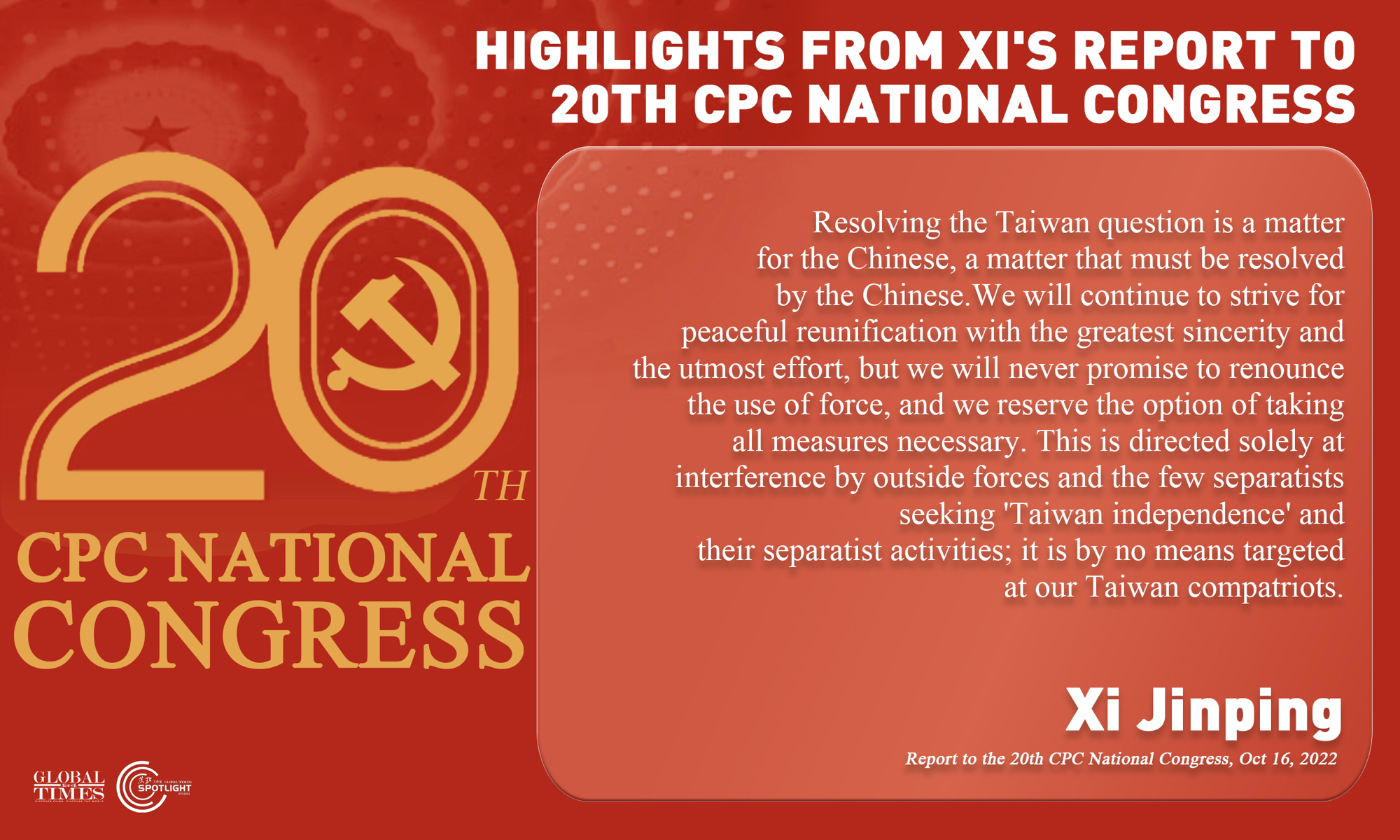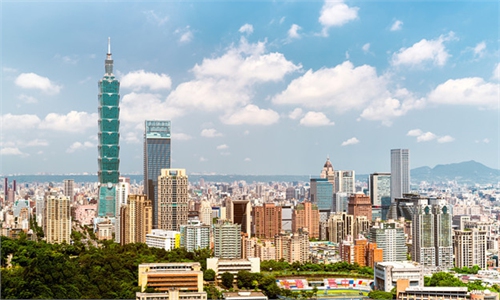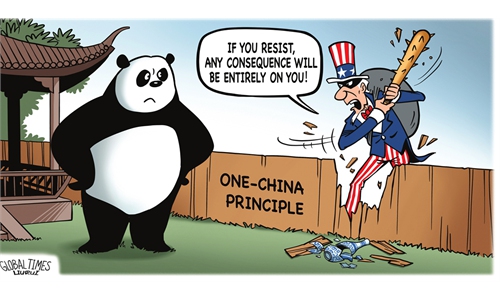20th CPC National Congress report on Taiwan question ‘a solemn pledge’, fresh warning to external interference, separatist forces: analysts

Highlights from Xi's report to 20th CPC National Congress Graphic: Xu Zihe/GT
Xi Jinping said on Sunday that the Communist Party of China (CPC) will implement its overall policy for resolving the Taiwan question in the new era, and unswervingly advance the cause of national reunification at the opening session of the 20th CPC National Congress.
He also said that we will continue to strive for peaceful reunification with the greatest sincerity and the utmost effort, but will never promise to renounce the use of force.
The latest remark is considered a solemn pledge in the new era concerning how to resolve the Taiwan question, experts said. It also conveys a special significance and serves as a fresh warning to outside forces and the few separatists seeking "Taiwan independence" that are biggest uncertainty and destructive forces to the cross-Straits peaceful situation. Meanwhile, the strong connection between national reunification and national rejuvenation has been reconfirmed, as national reunification serves as the basic political indicator of national rejuvenation, experts said.
Xi said we will continue to strive for peaceful reunification with the greatest sincerity and the utmost effort, but we will never promise to renounce the use of force, and we reserve the option of taking all measures necessary. "This is directed solely at interference by outside forces and the few separatists seeking 'Taiwan independence' and their separatist activities; it is by no means targeted at our Taiwan compatriots," he said.
Those remarks prompted long and loud applause in the Great Hall of the People, where the grand meeting was held, reflecting the common will of Chinese people.
Striving for peaceful reunification but never promising to renounce the use of force is our existing policy on Taiwan question, which is a strategic consideration and an oath in a new era, Zhang Wensheng, a deputy dean of the Taiwan Research Institute at Xiamen University, told the Global Times on Sunday.
"Reaffirming this basic line of policy also serves as a fresh warning not only to separatists in the island but also to external interference, as fighting against both separatism and external interference appeared to be not that urgent in the past, but now it's extremely necessary given a changing global environment, especially when foreign forces ramp up efforts in containing us by playing the 'Taiwan card,'" Zhang said.
In recent years, the US, along with some of its allies, has been manipulating the "Taiwan card" with the aim of containing China's development, seriously violating international law and the basic norms of international relations.
For instance, the highly provocative and dangerous visit of US House Speaker Nancy Pelosi to Taiwan in August and the US Senate Committee on Foreign Relations passing the Taiwan Policy Act of 2022 in September, in addition to continuing arms sales to the island, are considered moves that serve to constantly hollow out the one-China principle, and encourage and incite the island's DPP authorities to intensify the cross-Straits conflict.
The Constitution stipulates the sacred obligations and duties of national reunification, and the Anti-Secession Law of 2005 stipulates the circumstances under which national reunification with peaceful methods or non-peaceful means will be employed. And the 20th CPC National Congress report further clarified the existing policies and laws, Tian Feilong, a legal expert at Beihang University in Beijing, told the Global Times on Sunday.
"Non-peaceful means are also options targeting mainly interference by outside forces and the separatist activities, which also clearly draws out our principle and bottom-line, helping to form a strong deterrence to separatists and external forces and aiming to win more support in the island for peaceful reunification," he said.
Xi said resolving the Taiwan question is a matter for the Chinese people, a matter that must be resolved by the Chinese people. Some experts consider that this is a new statement further defining and positioning the Taiwan question as China's internal affairs, which have nothing to do with external forces and the external environment.
Wang Jianmin, a senior cross-Straits expert at Minnan Normal University, told the Global Times on Sunday that it is also a solemn representation to the world: Do not interfere in the Taiwan question. "If those forces continue increasing interference, it will trigger a cross-Straits crisis and force the Chinese government to take non-peaceful means."
The wheels of history are rolling on toward China's reunification and the rejuvenation of the Chinese nation, Xi said. "Complete reunification of our country must be realized, and it can, without doubt, be realized!"
Experts consider that national reunification and national rejuvenation are closely related and interdependent, and the national reunification should be realized in the process of national rejuvenation, as the national rejuvenation has greatly improved our military strength, economic strength and political strength in all aspects, laying out a stronger foundation for solving the Taiwan question.
"National reunification is a basic political indicator for national rejuvenation, as we can't imagine that China without reunification would make its people and international community believe that the national rejuvenation is complete," Tian said. "On behalf of all the Chinese people, Xi declared the strong collective will and capacity for completing the national reunification."
The central committee of the Chinese Kuomintang said in a congratulatory message to the CPC Central Committee on the 20th CPC National Congress that on the basis of "1992 Consensus" and opposition to separatists seeking to "Taiwan independence," that cross-Straits communication and cooperation have yielded fruitful results, hoping that the two parties will keep communicating and working together sincerely. Also, the two parties are expected to work on common ground by reserving differences and making efforts in safeguarding cross-Straits stability.



